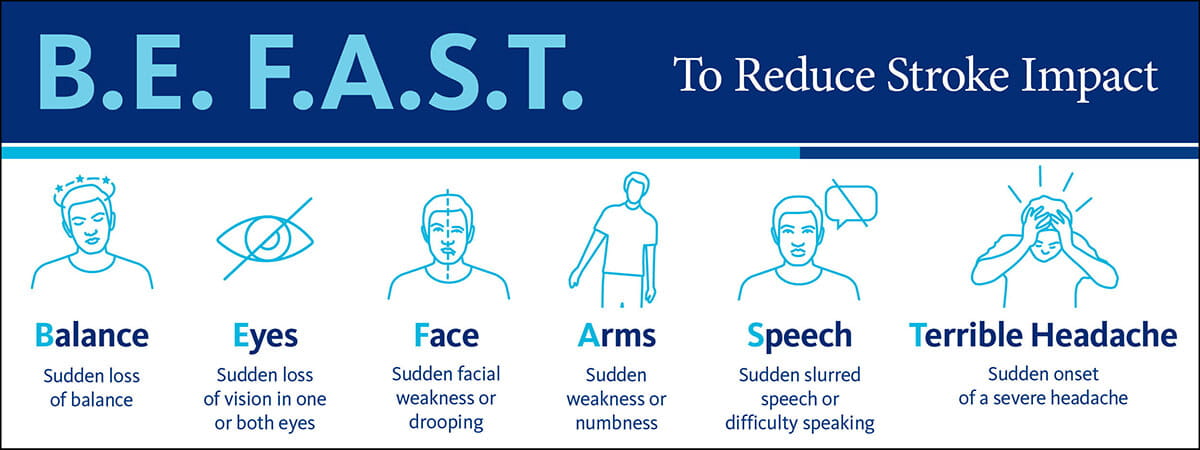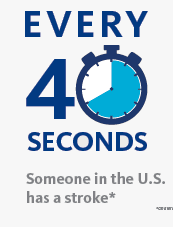What Is A Stroke?
A stroke occurs when blood flow to the brain is cut off or interrupted. It’s an emergency situation requiring immediate medical attention because damage may occur to the brain that results in the loss of many mental and physical functions.
Every second is important when you or someone you know is experiencing a stroke. If you or someone around you is experiencing a stroke, call 911 immediately. Individuals who are experiencing stroke symptoms need to seek medical attention immediately. Understanding a stroke, its signs and ways to prevent them, can possibly save a life and improve stroke recovery. Listen to our podcast to learn more about stroke signs and symptoms.
At BayCare, our doctors only need an opening about 3mm wide, 1/6 the size of a standard U.S. penny, to treat most strokes. It is by using advanced technologies like this that we can treat a stroke and help our patients get back to living life as soon as possible.
According to the Centers for Disease Control, stroke is the fifth leading cause of death in the United States, killing nearly 130,000 Americans each year—that’s 1 in every 20 deaths. Every year, nearly 800,000 people in the United States have a stroke, and on average, someone has a stroke every 40 seconds.
Getting fast medical treatment lowers the risk of disability or even death. That’s why it’s important to recognize the signs and symptoms of a stroke and to get help right away.
All of BayCare Stroke Centers are certified by DNV, an international accrediting body that emphasizes clinical best practices along with a disciplined management system. The certifications earned by BayCare’s 13 stroke centers signify clinical excellence demonstrated by the stroke teams and clinicians throughout BayCare Health System.
Find support groups for stroke survivors, family members and caregivers.
Stroke Symptoms
Immediate medical attention is needed when you suspect a stroke is occurring. B.E.F.A.S.T. and call 911 if you observe any of these symptoms in yourself or someone else:
- Sudden numbness of the face, arm or leg, usually on one side of the body
- Sudden vision problems
- Sudden difficulty in walking
- Sudden dizziness and/or loss of balance or coordination
- Sudden severe headache with no known cause
Types of Stroke
Stroke is a leading cause of serious long-term disability. It reduces mobility in more than half of stroke survivors age 65 and over. There are a few different types of stroke.
- Transient ischemic attacks (TIAs) are mini versions of stroke. They produce similar symptoms but last less than 24 hours, sometimes for just a few minutes. TIAs are often warning signs that a stroke will occur. Immediate medical attention is crucial to reduce the risk of a future stroke.
- Ischemic strokes occur when blood flow to the brain is blocked due to narrow or clogged arteries, the result of a buildup of plaque or other fatty deposits. Blood clots from someplace else in the body may also cause blockage. Approximately 85 percent of strokes are ischemic.
- Hemorrhagic strokes occur when a blood vessel ruptures in the brain. Causes include uncontrolled high blood pressure and weakened vessel walls, such as those found in aneurysms. The sudden bleeding from the ruptured blood vessel can damage brain tissue and increase pressure within the skull, causing a stroke.
Treatment
Immediate treatment is crucial for improving outcomes for stroke patients. BayCare offers innovative stroke treatments that use state-of-the art technologies and rehabilitative therapies.
- Transient ischemic attack (TIA) treatment: Medication therapy is used including antiplatelet and/or anticoagulation medications to prevent blood clot formation. Managing the underlying health conditions such as high blood pressure, cholesterol and diabetes is vital to reducing future stroke risk.
- Ischemic stroke treatments:
- Intravenous thrombolytic therapies such as tissue plasminogen activator (tPA) are clot-busting medications typically given within four-and-a-half hours of the onset of stroke symptoms.
- Mechanical thrombectomy is a catheter-based procedure used to physically remove a clot blocking larger arteries in the brain.
- Hemorrhagic stroke treatment:
- Immediate medical treatment includes managing blood pressure, reducing intracranial pressure, reversing any blood-thinning medications and managing seizures, if they occur.
- Surgical treatment includes open craniotomy or burr hole surgery to remove accumulated blood or reduce pressure on the brain. If an aneurysm is involved, surgical treatment includes placing clips to stop further bleeding.
- Endovascular catheter-based procedures may be used to treat aneurysms or vascular malformations with a neurosurgeon placing coils or stents to stop bleeding.
Stroke Rehabilitation
After a stroke, rehabilitation is essential for regaining function, independence and quality of life. The type of rehabilitation varies, based on the stroke type, severity and which parts of the brain were affected.- Physical therapy: Focuses on improving movement, strength and coordination
- Occupational therapy: Helps patients relearn daily living skills and adapt to physical limitations
- Speech and language therapy: Assists with communication, swallowing and cognitive skills
- Cognitive therapy: Targets memory, attention and problem-solving abilities
Vivistim is an FDA-approved nerve stimulation device designed for patients who are recovering from ischemic stroke who are at least six months post-stroke. Implanted in the chest and connected to the vagus nerve, the Vivistim device delivers gentle electrical pulses during therapy sessions. This helps the brain form new neural connections and improves upper limb (hand and arm) function when combined with intensive physical and occupational therapies. The recommended rehabilitation regimen includes three 30-minute rehabilitation sessions per week over a six-week period. Learn more about how BayCare patients have benefited from Vivistim. To find out if Vivistim may be an option for you or a loved one, contact your neurologist or neurosurgeon.
Risk Factors for Stroke
There are a variety of risk factors associated with stroke, some that can be treated, changed, or controlled, including:
 |
High Blood Pressure (Hypertension) The #1 leading cause of stroke, high blood pressure increases a person’s risk for a stroke four to six times. |
 |
Tobacco Use
Smoking causes narrowing of the arteries and increases a person’s risk of a stroke two to four times. |
 |
High Cholesterol High cholesterol levels can contribute to atherosclerosis caused by plaque buildup in the arteries. This plaque buildup decreases the amount of blood flow to the brain, which can lead to a stroke. |
Though some risk factors cannot be treated or changed, it’s just as important to know them to help you and your doctor know your risk for stroke:
- Age: The likelihood of having a stroke doubles for each decade of life after age 55.
- Gender: Stroke occurs more often and kills more women than men.
- Race: African-Americans are twice as likely to have a first-ever stroke than Caucasians.
Prevention
Many strokes can be prevented by making smart, healthy lifestyle choices. Talk with your doctor to determine what changes you can make that will reduce your risk of stroke and other medical conditions. Here are a few that can reduce the risk of stroke:
- Healthy diet: A diet rich in fruits and vegetables and low in salt, cholesterol and fat may help lower your risk of a stroke by reducing plaque buildup in the arteries.
- Regular exercise: Exercising can help control your weight and lower your blood pressure, both risk factors for stroke. Try to exercise for 30 minutes a day.
- Manage weight: Both diabetes and high blood pressure, two key risk factors for stroke, can be improved by maintaining a healthy weight.
- Control cholesterol: Use diet, exercise and, if needed, medications to manage cholesterol levels.
- Don’t smoke: Smoking can greatly increase your risk of a stroke or TIA. If you’re a smoker, ask your doctor for help quitting.
- Limit alcohol: If you drink alcohol, limit your consumption to one drink a day for women or two drinks a day for men.
Learn More About Stroke Treatment and Prevention at BayCare
BayCare offers care to individuals in Tampa, Clearwater, St. Petersburg, Plant City, Safety Harbor, Dunedin, Largo, Riverview, Winter Haven, New Port Richey and elsewhere in Tampa Bay, offering a variety of services for stroke diagnosis, stroke treatment and stroke prevention. To learn more about services available at our hospitals call (888) 906-8935.


